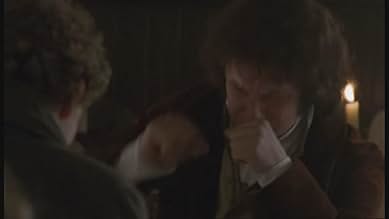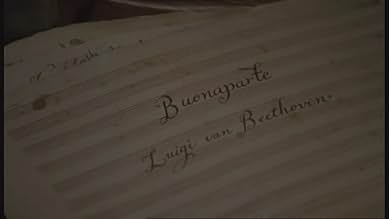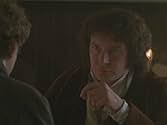Füge eine Handlung in deiner Sprache hinzuOn June 9, 1804, Ludwig van Beethoven and his pupil Ries assemble a group of musicians to give the first performance of his Third Symphony, 'Bonaparte', to his patron Prince Lobkowitz and hi... Alles lesenOn June 9, 1804, Ludwig van Beethoven and his pupil Ries assemble a group of musicians to give the first performance of his Third Symphony, 'Bonaparte', to his patron Prince Lobkowitz and his guests, including hypercritical Count Dietrichstein, in Vienna. The piece provokes polit... Alles lesenOn June 9, 1804, Ludwig van Beethoven and his pupil Ries assemble a group of musicians to give the first performance of his Third Symphony, 'Bonaparte', to his patron Prince Lobkowitz and his guests, including hypercritical Count Dietrichstein, in Vienna. The piece provokes political arguments among players and audience as to whether Bonaparte is a tyrant, or, as Beet... Alles lesen
Empfohlene Bewertungen
With that being said...I was brought into such a state of newfound discovery when I heard the Eroica again on this DVD. The Orchestre Revolutionnaire et Romantique somehow has made an old friend sound brand new again. With the size of the noticeable orchestra being smaller than we are normally accustomed, and with the pronounced accentuation of the individual instruments, the sounds and the development of the themes were fresh.
I enjoyed almost every performance in this film. It doesn't matter whose I didn't like. It really makes no difference. The presence of Ian Hart, Tim Pigott-Smith, Fenella Woolgar, Frank Finlay, Leo Bill, Trevor Cooper, the beautiful Claire Skinner, and mysterious Lucy Akhurst and gosh, even Victoria Shalet and Joseph Morgan made the whole affair quite an enjoyable experience and transformed this into a true ensemble of players.
The effect of the cameras moving about was a stroke of genius. The camera swirled as the thoughts of the people present and listening swirled around the room.
Enough cannot be said about IAN HART who really brought this together. Those of who the character of Beethoven so well should be pleased with his take. Here we have none of the scowling Beethoven smirks which plagued his later years. Here we still have a youthful, but adamant figure struggling to make his way into the world of Viennese society. Hart has cast a Beethoven in his prime though quite immediately after his "Heilegenstadt Testament" period of great sadness. He is young and he still bounce back and get back to the music. One instance of this bouncing back was quite remarkably placed near the end of the movie.
To lovers of Beethoven, lovers of the Eroica, lovers of great music, lovers of historical dramas and fine period pieces, I recommend this film without reservation.
The events of Beethoven's life seem compressed and shoveled into the 90 minutes of the film. We see how he deals with large issues like Napeoleonic politics, patronage, love, and hearing loss, as well as smaller issues like arranging music and the most efficient means of belittling his assistant.
What I found fascinating was being able to see how the characters of the period responded to the music as it was being played. I have a distant knowledge of Beethoven's works, and while they are certainly powerful and turbulent, I lack the context of the music of the era. Seeing the patrons react to various passages of the music (which to my untrained ear just sounds pretty) and hearing them comment on the work as it progressed was for me highly illuminating.
What a thrill it would be to be able to walk around an orchestra as it plays! That would be the ultimate in surround sound! I was jealous of the characters as they mingled around the players, who from what I can tell were using period-correct instruments.
I have had the great honor of performing this masterpiece when I was a student at Duquesne University, so it's always like coming home when I hear this piece. This film gave me an opportunity to visit it with fresh eyes and ears.
One thing I have to complain about is the usual one, the violas nearly always get short shrift when orchestras are filmed, but this is a small oversight in view of the entire movie.
Well done!
Much of the 'action' revolves around the audience of this magical performance. If only the Director had resisted the temptation to spin round the viewers as they watched! The film certainly flew by, but I was left wishing that this was only the start of the film and not the totality.
Wusstest du schon
- WissenswertesThe white muslin dress with yellow overdress worn by the farmhouse servant is the same costume Kate Winslet (Marianne Dashwood) wears during the picnic scene in Sinn und Sinnlichkeit (1995), and Michelle Ryan wears during the scene in which Sir Thomas asks Maria if she wants to marry Mr. Rushworth in Mansfield Park (2007).
- PatzerBeethoven's assistant was Ferdinand Ries, pronounced "Reese." The name was pronounced correctly in the film but incorrectly spelled "Reis" in the film credits. It was Ries himself who told the story of his incorrectly thinking the horn player came in early.
- Zitate
Princess Lobkowitz: [speaking about the Eroica Symphony] Unusual, though, wasn't it?
Josef Haydn: Unusual? He's done something no composer has ever done. He's placed himself at the center of his work. He gives us a glimpse into his soul. I expect that's why it is so noisy. But it is something quite new. Quite new. The artist as hero. Everything is different from today.
- SoundtracksEine Kleine Nachtmusik
(excerpt)
Music by Wolfgang Amadeus Mozart
Played by Orchestre Révolutionnaire et Romantique
Conducted by John Eliot Gardiner
Top-Auswahl
Details
- Erscheinungsdatum
- Herkunftsland
- Offizieller Standort
- Sprache
- Auch bekannt als
- Eroica - The Day That Changed Music Forever
- Drehorte
- Produktionsfirma
- Weitere beteiligte Unternehmen bei IMDbPro anzeigen
Zu dieser Seite beitragen































